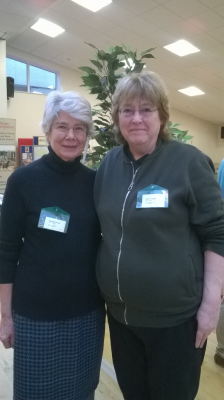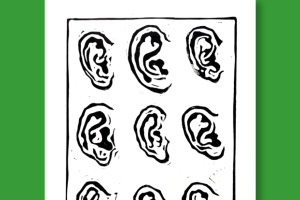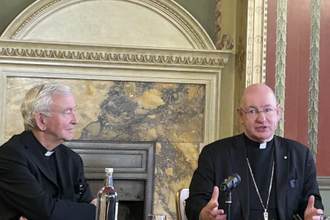Future Earth - our role in promoting sustainability

Barbara Wood with Ellen Teague
The following talk was given at the Christians Aware 30th anniversary conference 11-13 January 2019. The conference theme was: Future Earth? Sustainability for the environment, for farming and for healthy food? Ellen Teague is part of the Justice, Peace and Ecology Team of the Columban missionaries.
"They should have sent up poets rather than astronauts." The crew of Apollo 8 who produced the first picture of 'Earth Rising' 50 years ago felt they could not do justice to the beauty and wonder of Planet Earth. "We came all this way to explore the Moon, and the most important thing is that we discovered the Earth" said astronaut Bill Anders. The first pictures taken of Earth from the moon, have inspired the environmental movement of the last five decades.
In all our presentations at this conference we have been amazed by the crazy decisions made within the model of industrial agriculture which have poisoned soil and water, treated our fellow creatures as commodities and compromised healthy food. And mainstream society has largely gone along with it.
Will an Earth Rising pic 100 years from now still look the Earth of 1968?
But fantastic life-affirming initiatives are happening all the time.
Just 10 days ago the Oxford Real Farming Conference examined such initiatives as Food sovereignty, Real Farming and food, Launch of the UK Re-wilding Network, Regenerative supply chains, Alternatives to Plastic, Sustainable soil management - we should apparently be counting our earthworms!, Drought resilience, Stop the country farms sell-off, Saving local abattoirs, and saving Palestinian Seed diversity!
It also taught me a new word AGROPOLY: where a handful of corporations control world food production and food marketing. It's not just seed & agrochemicals, but also livestock genetics, feed, fertiliser, processing & food retail. Non-governmental organisations challenging this include Global Justice Now and the Gaia Foundation. It is interesting that at the conference, Michael Gove, Secretary of State for Environment, Food and Rural Affairs, expressed support for organic farming. And we've heard at our conference about Christian Aid's excellent work tackling the causes of Climate Change.
In the Catholic Church we now have more than 50 Livesimply parishes. More than 1000 churches have registered for eco-congregation. Eco-schools are becoming the norm. This weekend we've learnt about Climate Change campaigns, sustaining fresh water supplies, and promoting fairtrade. And we have the wonderful book for guidance edited by Barbara Butler 'Just Food? Food and Farming for a Sustainable Future'.
LET US RECALL THE IMPERATIVES FOR GREENING OUR LIVES AS CHRISTIANS:
The signs of our times; Scripture; Saintly lifestyles and examples; Churches' Social Teaching; and Liberation / Creation Theology. Clearly Laudato Si' has had a tremendous international impact and such imperatives as the call to listen to "the Cry of the Earth and the Cry of the Poor" and promote "Ecological Conversion" have certainly influenced Columban mission.
WE NEED AN ECOLOGICAL CONVERSION ….but often we are held back by fear.
Fear of a transition to a plant-based diet
In the lead up to the recent holiday, I thought Christmas was ruined.
In my Christmas supermarket shop I accidentally bought vegan mayonnaise!
But the numbers of people following a plant-based diet have soared over the last 10 years. Food and restaurant consultants highlighted veganism as the major global trend of 2018, and the food industry has been racing to keep up with the demand. 33% of its restaurants now offer vegan options. M&S is launching a Vegan range. What is highly significant about this rapid transition is that the trend is being led by young people - 54% of vegans in the UK are under 35 years old. Young people are showing greater interest in experimenting with vegan diets than their parents. This is encouraging as it is suggestive of a potential generational shift in eating habits, which if it continues to grow apace, could be vital to combating further environmental degradation.
The average Brit currently eats more than 11,000 animals in their lifetime - one goose, one rabbit, four cattle, 18 pigs, 23 sheep and lambs, 28 ducks, 39 turkeys, 1,158 chickens, 3,593 shellfish and 6,182 fish. At this centre the National Justice and Peace Network has a conference every July and in recent years the menu has been largely vegetarian. There are some complaints but NJPN sticks with it because they feel it is the right thing to do to lower the carbon footprint of the conference.
Fear of bees and insects.
Honeybee colonies have been declining globally, with the main culprit being pesticides. One-third of the food we eat depends on pollinating insects, and in Europe alone, 4,000 vegetables depend on insect pollination. Since 2010 there has been a 45% loss of commercial honeybees in the UK, and it isn't everybody who cares. I have heard people say they wouldn't miss the loss of any stinging insects. Appreciating biodiversity is vital and especially bees. In Amsterdam, since 2000, Amsterdam's bee population has risen by 40%. Planting native flowers in public spaces (such as in parks and on street corners), installing insect homes across the city, and introducing a ban on the use of chemical pesticides in public spaces has enabled Amsterdam's bee population to bloom.
Fear of migrants and refugees
Many refugees are fleeing that double threat of environmental breakdown and conflict. By 2050, there could be up to 200 million people displaced by rising global temperature - according to the International Organisation on Migration. As global temperatures increase, more and more people are feeling the impacts of climate change. Drought and extreme storms are forcing people to leave their homes in search of a better life. And there is an increasing risk of communities clashing over precious natural resources such as water. Despite the context of demonising refugees, I am very proud of our Churches consistently speaking out on the Gospel imperative to welcome the stranger.
Fear of public transport!
I was slow to do it, but when age entitled me to a free travel card it meant that I was forced to explore local transport links. I discovered that they were excellent. I do have a car for events like this where I am carting materials around but it is now a hybrid car - it recharges its own battery 'on the move'. I still fill up the tank, as I have a conventional petrol engine - but hybrid efficiency means that fuel lasts that much longer.
But not many of us embrace fundamental change. I am inspired by people who refuse to fly. The teenager, Greta Thunberg, who shamed world leaders at the recent COP24 climate conference in Poland tweeted last week: "Recently I've been invited to speak in places like Panama, New York, San Francisco, Abu Dhabi, Vancouver, British Virgin Islands... But sadly our remaining carbon budget won't allow any such travels. Adult generations in countries like mine have used up our resources." She really does understand the implications of the climate crisis and the need for radical change.
Many Green Christian members walk the talk, and some are now active in Extinction Rebellion - lobbying for radical change through non-violent direct action. We should be aiming for a zero carbon lifestyle and this will mean fundamental transition.
I am just one generation from Irish rural life. My brothers and I spent summers on farms with no running water in the house, no indoor toilets, no refrigeration. Much as we loved those holidays I am not romantic about the hardships of a simple rural life in a pastoral society, particularly in Winter. Yet, I do fear being forced into sudden change, so we must take the opportunity for a slower transformation over the coming two decades.
I love the term "ecological conversion" but I do fear its implications.
But let's look at why churches hold back…. Here's a list:
• We like our modern lifestyle
• Still hooked on 'trickle-down' development model
• Neglect of justice for future generations
• Tolerance of conflict and weapons
• Urbanised peoples detached from natural world
• Addressing short-term issues/emergencies
• Despair over the scale of the problems
• Gender discrimination / Patriarchy
• Lack of awareness of creation-centred theology
• Fear of the challenges in 'Laudato Si'
But change is happening. What is coming up this year?
• A growing divestment movement which boycotts fossil fuels.
• More communities blocking fracking in their areas
• The Pan Amazonian Synod in October at the Vatican which will focus on the challenges to mainstream society presented by indigenous peoples' knowledge and perspectives.
One small thing we can all do is show gratitude for the fruits of Earth through saying Grace. Among many of the world's great faith traditions, saying Grace is important. Perhaps the loss of blessing and thanksgiving has a lot to do with the destruction of the world and particular bio-regions. Perhaps we should recover the practice of saying Grace, and participate in the healing of the world.
Norman Wirzba of Duke University - whom I suspect is a poet - says:
"Saying Grace introduces us to a new understanding of ourselves as creatures placed in a world of gifts. Among many of the world's great faith traditions, the eating of food is accompanied by some form of a Grace-saying act. To say Grace is a complex act, expressing gratitude and devotion.
It is also an act that aims to clarify humanity's place in the world. In offering thanks or a blessing, people aim to show that they do not take their food and their lives for granted. To say Grace, or offer a benediction of thanksgiving over our daily meals, is the highest and most honest expression of our humanity. In this act, we show that we are committed to taking our rightful place within the world among each other and before God, and demonstrate that we do not take our place and our sustenance for granted. Here, around a table and before witnesses, we testify to the experience of life as a gift to be received and given again. But in the act of thanksgiving, we at least express our commitment to remember as best we can, and through this remembering bring healing to creation and praise to God as the life of our life."
On the internet the picture of 'Earth Rising' has some strange captions generated by so-called artificial intelligence. One says: 'A football over a turbulent sea'.
Computers can get it very wrong, and so can we.
Let's start getting it right.
And let's thank Christians Aware for three decades of keeping us better informed.


















